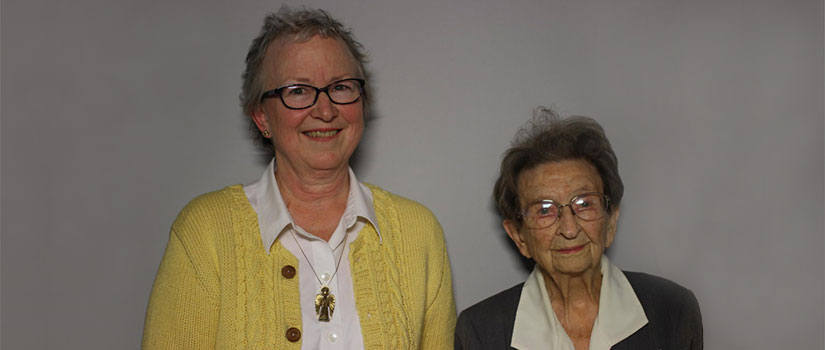Just four years short of 100-years old, Sarah Leverette sat down with Lisa Wilcox, wife of University of South Carolina School of Law Dean Rob Wilcox, to share her experiences as a woman trying to start her legal career in the 1940s. But this was no ordinary get-together over a cup of coffee. In fact, it was being recorded in the StoryCorps mobile recording studio during the organization’s stop in Columbia in late 2016. Their conversation, which will be archived in the Library of Congress, was also broadcast in January 2017 on South Carolina Public Radio, as part of the network’s series, Narrative.
Leverette recalls that in the early 1940s, women didn’t go to law school. And if they did, they didn’t finish. When Leverette began classes at South Carolina Law, she was one of three women. However, she was the only one to complete her studies. Leverette received her juris doctorate in 1943, 25 years after Minna Layton Holman and Claudia James Sullivan became the School of Law’s first female graduates in 1918.
When it came to getting a job, her gender was always a point of contention.
“I knew the door was closed, but I did not know it was locked. And the key was in the pocket of some man,” says Leverette.
Leverette recalls being expected to perform secretarial duties, and while work was difficult to find, she refused to settle, even resigning from her first job at a law firm when she was asked to clean the office. She took a job with the state, working at the South Carolina Department of Labor. She used her legal skills, yet as a woman, was paid as a statistician, a salary much lower than her fellow male lawyers. The law school dean at the time, Samuel Prince, encouraged Leverette to go back to school. She received a master’s degree in legal research and law library administration from Columbia University. In 1947, she returned to USC, becoming the first female faculty member at the School of Law, where she taught legal writing and became the law librarian.
After 25 years at the law school, Leverette was tapped by Gov. John West to serve a six-year term on the Workers’ Compensation Commission. She recalls being paid the same amount as her male counterparts, saying “the ice was thawing on women lawyers.” She acted as the chair for the commission for two years, and when she left, two members were appointed to fill her vacant seat.
“It took two men to replace me,” says Leverette.
She remained a consultant for the commission until 1985. Upon her retirement, Leverette stayed involved in community organizations, including the League of Women Voters.
“Retirement from our work—our trade, our professions—does not give us the right to retire from the human race,” says Leverette. “It only gives us a more flexible lifestyle in which to continue our work for the common good.”
Within those organizations, Leverette developed her closest friendship, citing them as the source for her accomplishments. When she looks back on her life, Leverette says she’s learned that cultural attitudes take time to change. All she wants to do is pass on the history she’s lived, in hopes that younger people will change the future.
Leverette’s story was one of several recorded by South Carolina law alums during StoryCorps’ visit. Pamela Robinson, director of the Pro Bono Program at the School of Law, reached out to StoryCorps to help set-up the series of interviews, which include stories from current students, as well as alums.
“As natural storytellers, lawyers are a perfect match! It is a win, win,” says Robinson. “I viewed our collection of stories as a way to show the range of our impact and involvement from a present day student to past students and even to a 96-year-old lawyer who still has much to teach all of us.”
In the StoryCorps conversation between Wilcox and Leverette, the 1943 graduate says she’s still learning and still teaching. While her long life has been well-lived, and with few regrets, she hopes for an easier future for those who follow her. And among all of her accomplishments, Leverette says she wants to be remembered by the way she saw others.
“We were all given a mind and we were all given a heart,” says Leverette. “The mind was given to us so we could survive, so we could make a living. But the heart was given to us so we could survive together.”
Listen to the complete interview with Leverette, as well hear all the stories recorded by friends, alumni and students of the School of Law.
